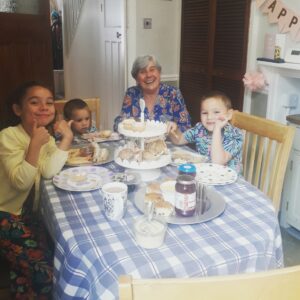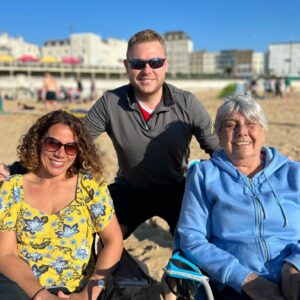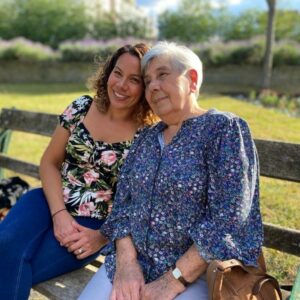
19 Sep 2024
The gift of precious time: Barbara’s story
“They’re the generation that doesn’t make a fuss, I know. But we all really need to make a fuss. Raising awareness about the signs of leukaemia could mean an earlier diagnosis, and that could really make a difference.”
As a fit and active mum and grandmother in her 70s, Barbara Blenman thought nothing of the half-an-hour walk to see her nearby family in Leyton, London. But in the autumn of 2020, she began to struggle.
“Mum had been to the dentist and was told that she had a gum infection,” said Barbara’s daughter Kate Betts, 43. “She was prescribed antibiotics, and we initially thought she had had a reaction to the antibiotics as the next day she was flat out in bed. She had flu symptoms, dark urine, a high temperature and chills. In hindsight, there had been a few more signs before she really went downhill. She had been struggling with breathlessness when walking to the shop. It was only ten minutes away and Mum was a fit person. It was Covid time, and she had her mask on, and we wondered if that had affected her breathing or that she was maybe feeling anxious because of the pandemic.”
Just a week before Barbara’s diagnosis, Kate’s husband Andrew moved in with his own mum to care for her as she’d been diagnosed with terminal pancreatic cancer. This left Kate in an incredibly challenging situation.
“I was at home with three children, and my six-year-old had to isolate due to a Covid case in his bubble at school. Mum rang me to say she’d become unwell on the Tuesday and told me to stay away as it might be Covid, but she’d let me know if she needed anything. I saw her on Friday 11th December when my husband came home from his mum’s to collect some belongings. As soon as I walked into her flat, I knew something was wrong. There was a smell, I can’t describe it, I don’t know what it was but I call it the leukaemia smell and it came back every time she relapsed. She was clearly very poorly, and I called her GP immediately. He said to call an ambulance but on hearing this, Mum started shaking and saying she didn’t want to go to the hospital. So, we agreed I would keep an eye on her over the weekend and get her to the surgery on Monday for a blood test.

Barbara was very close with her children and grandchildren
“My husband took her for the test on Monday. I stayed behind with the children, but when they came back and I saw her, I knew immediately things were bad as her colour had changed and she just looked yellow/grey. It was a freezing cold day, and she was sweating in just a t-shirt and looked much worse than she had on Friday. So, I called an ambulance. They first sent a doctor who took more blood from her then she was taken to Whipps Cross Acute Assessment Unit in Leytonstone. They found her white cells were ‘all over the place’ and kept her in.”
Shortly afterwards, Barbara was moved to St Barts Hospital in London for a bone marrow biopsy. On December 17th 2020 it was confirmed the 76-year-old had acute myeloid leukaemia (AML).
“It wasn’t a complete shock to be honest, she looked so poorly. The doctor who came to her home had said he thought she might be anaemic when he took the blood test. I’d done a bit of research over the previous couple of days and leukaemia had come up several times. So, in a strange way I was prepared. But it was awful. By that time, she looked like she was dying, and they said she was days if not hours away from death.
“Mum was given blood and platelets which immediately made her feel better. She started her chemo on Christmas Eve. From this point, due to the pandemic, I couldn’t see her for about three weeks, which was horrific as she spent Christmas alone in hospital. We were in lockdown; my husband was in Sussex looking after his terminally ill mum and I was home alone with three small children. We both managed to get some things to the hospital for her, including a new contract phone as we couldn’t top her phone up, and lots of treats, books, magazines to keep her spirits up.
“Initially the chemo was going well but after a few days mum got very unwell and was also feeling very low. I could see her on 6th January for a few hours. It was quite honestly the worst time of my life, knowing Mum was alone, imagining what was going through her head and not being able to be there for her, as well as having to tell my children that their nanny was very poorly. Also, my husband and mother-in-law needed support too.”
Doctors found Barbara had developed pneumonia in both her lungs and she was taken immediately into intensive care.
“I had a call from the doctor and was told to come in and meet with Mum’s team. They said Mum wasn’t expected to make it through the weekend. I was devastated. I was the only visitor allowed to see her, and she managed to chat for a while but then she needed to rest. I didn’t hear anything after that from the hospital and, as it was the weekend, it was very difficult to get hold of anyone. Finally, I got a call on Monday to say Mum had been moved to the ward. I couldn’t believe that she had made it through the weekend. It was a miracle

Despite the prognosis, Barbara enjoyed 9 more precious months with her family
“But I soon realised when I saw her that she had developed delirium and didn’t know who I was. I was able to visit her every day, but it was so hard seeing her like that, and I had to keep talking to her, reminding her who I was and telling her stories about our family to bring her back to us. Sometimes she was very overwhelmed but a few days later she recovered and was herself again. My brothers were now able to visit (one flew over from America) and Mum went home on the 27th January.”
After her recovery, Barbara was able to stay at home and continue with her chemotherapy with an injection administered by Kate twice a day for a week every month. Having had this extraordinary turnaround, Barbara went into remission, regained her strength and spent the summer enjoying time with her family.
“That time was a gift. It was a miracle she survived, and the doctors said they don’t know how she did it. She was weak at first, but soon she was well, and we went on day trips with the kids. We went to the Kent coast and spent a weekend in Chester. My brother from America was there with his wife and two children. It was a really precious time. We knew she would relapse – I thought maybe we had three or four months – but it ended up being nine.”
Barbara’s leukaemia returned in September 2021 and she was back in hospital until November. She was started on the targeted therapy drug Gilteritinib which left her with severe skin reactions, allergies and infections. Throughout Spring 2022, Barbara made many trips back and forth to hospital for treatment and tests, but her leukaemia came back again in July. Barbara passed away on 28th August 2022 in hospital with Kate by her side.
“We were so close and I miss her every day. We’d talk five or six times a day and she only lived half an hour’s walk from me. She was so strong and so brave. My dad died suddenly when I was 16 and I think that brought us together so strongly.
“I would urge anyone who notices anything in themselves or their older parents that they think is unusual to go to the doctor. Any noticeable changes that you would see and think ‘hmmm that’s not like them’. Mum never got ill and never made a fuss. She’d had breast cancer years ago and survived it.
“The sweating and breathlessness were unusual, looking back, but Mum told me about it in passing, with no concerns at all, and we just thought it may have been because she had not been out for a long time because of the pandemic and was just getting back into going out shopping for herself. But to see how the illness gripped Mum so quickly, when she had been fine the previous week, shows how aggressive AML is. I think older people need to have regular GP checkups and more routine blood tests. They’re the generation that doesn’t make as fuss, I know. But we all really need to make a fuss. Raising awareness about the signs of leukaemia could mean an earlier diagnosis, and that could really make a difference.”

Barbara and Kate would talk several times a day and were extremely close.
Related posts
10 January 2023
Clinical trial begins for pioneering new cancer treatment
Dr Konstantinos Tzelepis was awarded a Leukaemia UK research fellowship in 2020 and has developed a new class of cancer drug with the potential to treat leukaemia.
25 June 2019
Championing groundbreaking therapies and emotional support
We are proud to be at the forefront of funding innovative research into gene therapy treatments
19 August 2022
Leukaemia Care and Leukaemia UK announce financial support collaboration
Leukaemia Care and Leukaemia UK are pleased to announce a collaboration to provide financial support to people affected by leukaemia, through the financial hardship fund. Leukaemia Care have provided 364…
31 October 2023
Chris Dew joins Leukaemia UK as Director of Finances & Resources
Leukaemia UK is delighted to announce the appointment of Chris Dew as Director of Finance & Resources, following ten years as Chief Financial Officer at musical therapy charity Nordoff-Robbins. The…